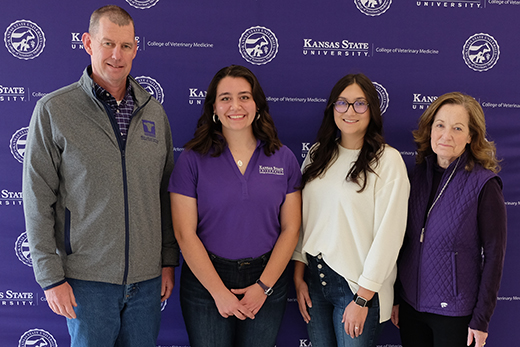College of Veterinary Medicine adds two students to rural training program
Monday, Oct. 24, 2022

Two Kansas State University veterinary students are new recipients of the Veterinary Training Program for Rural Kansas financial aid. From left areBrad White, professor of production medicine for the College of Veterinary Medicine, with veterinary students Violet Biggs and Jayden Hanna, and Bonnie Rush, Hodes family dean of the College of Veterinary Medicine. | Download this photo.
MANHATTAN — Recent Kansas legislative changes are bolstering a long-running, successful program in Kansas State University's College of Veterinary Medicine.
Increased funding by the state of Kansas beginning in fiscal year 2023 allows for the selection of additional Veterinary Training Program for Rural Kansas loan recipients and an increase in aid to all students currently in the program.
New additional Veterinary Training Program for Rural Kansas scholars are Jayden Hanna, Elkhart, and Violet Biggs, Pittsburg. They are joining Chelsey Bieberle, Bushton; Emma McClure, Hugoton; Bryant Karlin, Manhattan; and Chandler Rogers, Topeka. These scholars are second-year veterinary students scheduled to complete their Doctor of Veterinary Medicine degrees in May 2025.
"We are excited to be able to add Violet and Jayden to the Veterinary Training Program for Rural Kansas," said Bonnie Rush, Hodes family dean of the College of Veterinary Medicine. "This program is fulfilling a critical mission to provide veterinary care and service in rural areas of Kansas. We are grateful to the Kansas legislature for recognizing the impact of this program and for committing to its growth and allowing us to train more students than before."
The Veterinary Training Program for Rural Kansas was originally passed by the state Legislature in 2006 and offers a financial incentive to future veterinarians committed to providing veterinary care in rural areas of Kansas. Upon completion of their Doctor of Veterinary Medicine, each student is required to work at a full-time veterinary practice in one of 92 Kansas counties with less than 40,000 residents. For each year the student works in rural Kansas, up to $25,000 per year of qualifying student loans are forgiven over a four-year period.
To date, 96% of graduates are completing or have completed their loan obligation through service. Graduates who do not complete service are required to repay the loan. The funds are reinvested through the addition of students to the program. Ninety-three percent of previous graduates who completed their four-year obligation remain in a qualifying county. Seventy percent remain in the original practice and community they entered after graduation.
"The Veterinary Training Program for Rural Kansas helps retain some of the brightest and best veterinary students in Kansas," Rush said. "The participants — past, present and future — join a unique community of supportive colleagues and represent the future of rural veterinary practice in Kansas."
Part of the required training includes completing a food animal veterinary certificate. The student scholars also spend time during the summer and breaks in the academic year learning about foreign-animal disease preparedness, natural disaster response, rural sociology, small business management and public health. During their senior year, they will spend three weeks in a rural veterinary practice, applying the principles of small business management to rural veterinary practice.
Additional changes to the program include the creation of an advisory board consisting of two representatives from the Kansas Department of Agriculture, two members of the Kansas Veterinary Medical Association, the Kansas Animal Health Commissioner and two representatives from the College of Veterinary Medicine. A subgroup of the board now serves as the selection committee for the program participants.
"We appreciate the guidance and input from our new advisory board," Rush said. "In the spring semester, we plan to choose seven students for the Veterinary Training Program for Rural Kansas for the class of 2026, so we are also thankful to the members of the selection committee for their efforts in choosing these new students.
